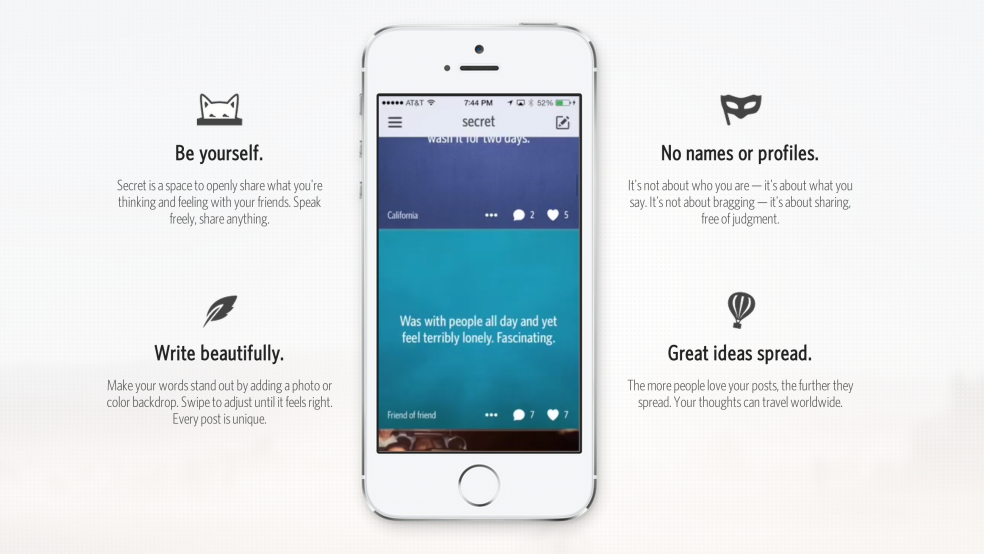"When I smoke in San Francisco I feel like everyone is judging me." As confessions go, it’s not the most revealing — yet the post may say something about the site it appeared on: the five-week old social media site Secret. As the name implies, posts are anonymous, and run the gamut from the confessional, like the above, to the prosaic: "I love making breakfast for my wife."
Per the company's website, Secret was built so that people could "be themselves and share anything they’re thinking and feeling with their friends without judgment" — hence the lack of profile photos and names — and also because "great ideas should spread on their own merit."
It’s part of a growing number of apps and sites that seek to let people interact without the fear of a lasting digital record associated with their names. Snapchat, of course, lets users share photos that quickly vanish, allowing for self-expression without the permanent footprint (in theory, at least). Apps like Whisper and Cyber Dust offer similar promises of anonymity or evanescence.
Online anonymity is nothing new, of course, but Secret and its ilk tap into our desire to share while avoiding, at least in principle, the dangers than have been so associated with public posts to Facebook or Twitter.
Secret's software connects users (on Apple’s iOS, so far) by tapping their address books and dropping the contacts into an algorithm, which determines who users' "secrets" should be sent to. But secrets aren't automatically sent to everyone in your contact list. Per the site, "Contacts are simply a strong signal in the algorithm." When secrets travel beyond two degrees of separation, they're tagged with a location, but that's as close as the network ever gets to naming names. Messages on user feeds otherwise appear as being from "friend" or "friend of friend."
Unsurprisingly, Secret is based in San Francisco. Perhaps even more unsurprisingly, its co-founders are ex-Google employees: Chrys Bader and David Byttow. Aside from them, there's only one other full-time employee, though that may be about to change: The company recently announced it has secured $8.6 million in capital funding.
Other than that tidbit, Secret likes to keep certain things, well, secret, like how many users it has. It is, however, wide open about how the back-end system works, presumably to reassure users about the anonymity of their posts and the security of their data.
Don't Be a Jerk
"Thoughts have been shared across the country that are honest, moving, hilarious, and contrary to expectations, rarely inappropriate," Byttow says about his company's service. "This reaffirms our belief that anonymity can foster positive change in the world."
The cloak of anonymity also fosters gossip, rumor, slander and incivility — anyone who reads the comments sections of online news articles knows this. Of course, it's not like there's any shortage of that sort of thing on Facebook or Twitter, sites that require at least some level of fessing up about who users really are.
Maybe most intriguingly, Secret has also become a way for grumblings about Silicon Valley culture to go public, with a fair amount of the site's traffic so far spent rendering judgment on tech colleagues, the tech industry and Secret itself.
Related posts include: "We're at Nojo sitting the next table over from Zuck and talking loudly about how much we love using Secret"; "It makes me sad to hear consistent stories about the GitHub boys being misogynistic neckbeards"; and, "The folks who are most worried about bullying on Secret are the folks secretly known for bullying their teams and coworkers."
Keeping a secret can be fun, but not nearly as much as telling one. Add in almost guaranteed anonymity (we've all learned that nothing is unhackable), and there's good reason to believe that Secret — or some app like it — will find a home in social media.
Top Reads from The Fiscal Times:



